 Crime
Crime  Crime
Crime  Technology
Technology 10 Hilariously Over-Engineered Solutions to Simple Problems
 Miscellaneous
Miscellaneous 10 Ironic News Stories Straight out of an Alanis Morissette Song
 Politics
Politics 10 Lesser-Known Far-Right Groups of the 21st Century
 History
History Ten Revealing Facts about Daily Domestic Life in the Old West
 Weird Stuff
Weird Stuff 10 Everyday Products Surprisingly Made by Inmates
 Movies and TV
Movies and TV 10 Actors Dragged out of Retirement for One Key Role
 Creepy
Creepy 10 Lesser-Known Shapeshifter Legends from Around the World
 Animals
Animals 10 Amazing Animal Tales from the Ancient World
 Gaming
Gaming 10 Game Characters Everyone Hated Playing
 Crime
Crime 10 Terrifying Serial Killers from Centuries Ago
 Technology
Technology 10 Hilariously Over-Engineered Solutions to Simple Problems
 Miscellaneous
Miscellaneous 10 Ironic News Stories Straight out of an Alanis Morissette Song
Who's Behind Listverse?

Jamie Frater
Head Editor
Jamie founded Listverse due to an insatiable desire to share fascinating, obscure, and bizarre facts. He has been a guest speaker on numerous national radio and television stations and is a five time published author.
More About Us Politics
Politics 10 Lesser-Known Far-Right Groups of the 21st Century
 History
History Ten Revealing Facts about Daily Domestic Life in the Old West
 Weird Stuff
Weird Stuff 10 Everyday Products Surprisingly Made by Inmates
 Movies and TV
Movies and TV 10 Actors Dragged out of Retirement for One Key Role
 Creepy
Creepy 10 Lesser-Known Shapeshifter Legends from Around the World
 Animals
Animals 10 Amazing Animal Tales from the Ancient World
 Gaming
Gaming 10 Game Characters Everyone Hated Playing
Top 10 Fascinating Facts About Army Basic Training
It is a massive life decision to join the military. Even though a marriage can kill you, signing up for the Army means you may be in a conflict-zone months after signing your life, your rights, and your freedoms away. In the United States Army, which is the specific branch discussed today, once your signature is on that enlistment document, you become property of the U.S. government.
So you passed your ASVAB (Armed Services Vocational Aptitude Battery), medical exam, and piss test (a hard one for all those stoners out there), what happens next? Recruiters are paid very decent bonuses for each recruit enlisted and some will say all kinds of things to get you in. But what’s the truth?
10 Fascinating Facts About The Ancient Roman Army
10 Processing
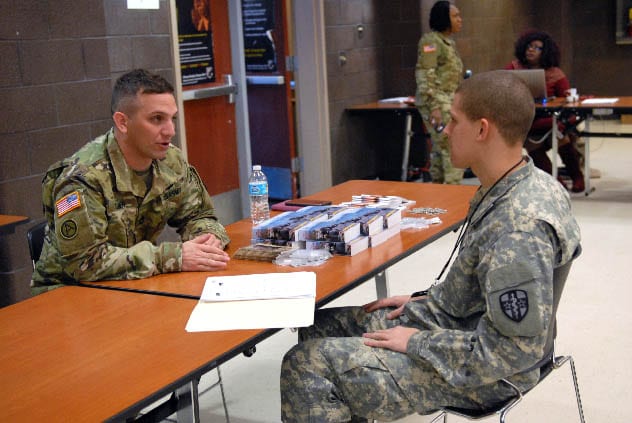
Let’s use some practical knowledge here, you aren’t showing up to basic training with your favorite skateboard shoes and Gameboy color. Recruiters demand that you pack light and all non-regulation items are temporarily confiscated. Kind of like when you check into jail or prison. So no, you will not be able to bring your granddaddy’s WW2 revolver with you. You aren’t even allowed non-religious literature and the army even demands you use their letterhead and stationary for one of the only forms of correspondence you will have with the outside world (more on that later). So it’s pretty much underwear, socks, running shoes and the clothes on your back.
The army processes hundreds of people a day in a single fort and it typically takes a week of being bumped around temporary lodging, eating horrible prison-like cheese sandwiches with cafeteria cartons of milk, and what seems like days of signing your life away even further. Then, once all the paperwork is completed, they shave your head, fit you with camos (or A.C.U. for Advanced Combat Uniform) and boots, and then mercilessly stab you on your buttocks with about a dozen needles containing practically every inoculation known to mankind. You are their property and they make sure you are properly vaccinated. Processing is the most sleep-deprived, mundane, and in my opinion, worst part of basic training. Two days in and you will literally be begging to be assigned to a company, drill sergeant, and platoon. Processing is basically limbo where you are manhandled until you at least look like a soldier . . . but that doesn’t mean you are one.[1]
9 Welcome to Basic
Once settled into your platoon you will get a proper welcome from your assigned drill sergeants. From the moment you meet them, they let you know exactly what you signed up for. Push-ups and laps, literally non-stop. But after bouncing from temporary bed to temporary bed during processing, it will be bittersweet to finally have a bed to call your own for the duration of basic training. Once introduced to your barracks, you scrub it clean and most recruits fail miserably the first few weeks trying to wax the floors with a buffer from the Korean War-era. Those first few days you get “smoked” (verb for punishment from a drill sergeant) for every little infraction as they are training you how to speak, think, and act like a “private”. They also start off with problem-solving obstacle courses and constant review and testing of ranks and weapon stats from the Basic Training Soldier’s Handbook. And the drill sergeants are watching, seeing who’s competent and who’s a buffoon.[2]
8 Squad-Leaders, Weaklings, and Recyclables

Although the D.S.’s (Drill Sergeants) already know who is strong and who is weak, this is America and it is your own fellow members of your squad, a further breakdown of a platoon consisting of about a dozen soldiers, who decide who leads them. Squad-leaders don’t have direct power, but act as the intermediary between the D.S.’s and the rest of the squad and platoon. This is necessary because every single basic training cycle has at least one idiot who is going to be a “Gomer Pyle”. There are also usually “recycles” tagged onto a platoon who have failed the previous cycle and need to go through the entirety of basic again. Yes, if you fail, you go and do it all over again![3]
7 Gun Day
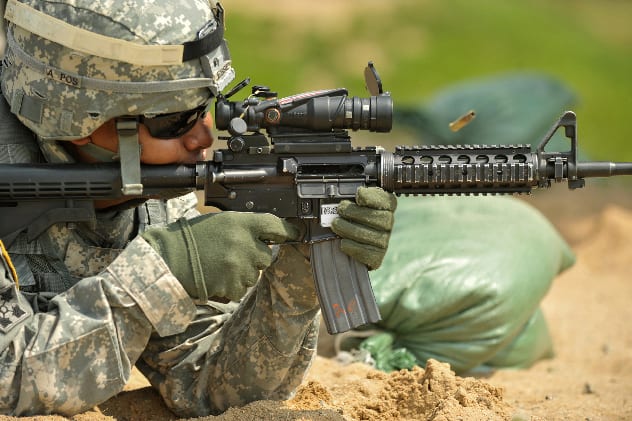
Surprisingly, you get your gun pretty much off the bat. It’s an exciting day for any soldier, but you will not fire it for weeks. It’s a bit torturous, but necessary. Like a puppy being house-trained, you need to be programmed to never let your rifle out of your sight. Then they gradually train you how the rifle works, constantly taking it apart and reassembling it. Finally, they take you out to the range on an almost daily basis. To graduate, out of 40 shots, 23-29 hits gets you marksman, 30-35 gets you sharpshooter, and 36-40 gets you expert marksman.[4]
6 The Grub
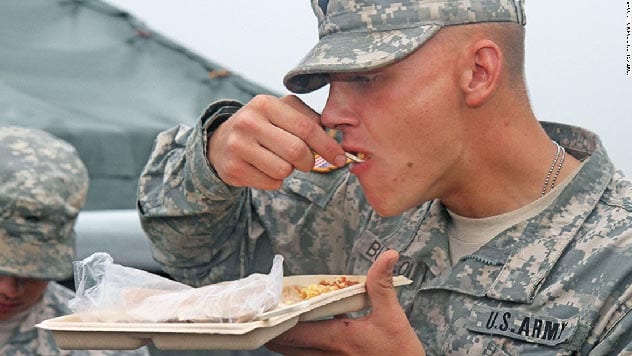
Honestly, the food is not bad. You are property of the U.S. government and they want you well fed and maintained. For example, if you intentionally hurt yourself, you are charged with destruction of government property. With that being said, they keep you fed.
Breakfast is a massive deal on every base I’ve ever been stationed on and almost every base does two kinds of breakfast. You have the “Yankee” breakfast of eggs, bacon, English muffins, and even an omelet station (yes, even in basic), and then you have the “Southern” breakfast consisting of biscuits and gravy and grits. America is huge, we don’t alleat the same thing in the morning.
For lunch, you are almost always out in the field on a training exercise so they either set up a tent and serve chicken fried steak or spaghetti with greasy ground beef or they simply throw (literally, you can get smacked in the face with a bag while the D.S.’s hurl them) M.R.E.’s (Meals Ready to Eat). When you are that exhausted, everything looks like a Michelin-starred meal. Plus M.R.E.’s come in random flavors so it’s fun to sit in the dirt haggling and trading the various flavors of entrees or cookies.
Dinner is always solid. Pot roast, pasta, or even steak; there really is no place for vegetarians or vegans in the military. The ringer is that although the food is good, you seriously have two minutes to scarf it down before the D.S.’s start clearing the tables for the next round of privates. And I’m not exaggerating, you better inhale your meal or you go hungry.[5]
10 Alleged Secret Weapons Of The US Military
5 Barrack Life
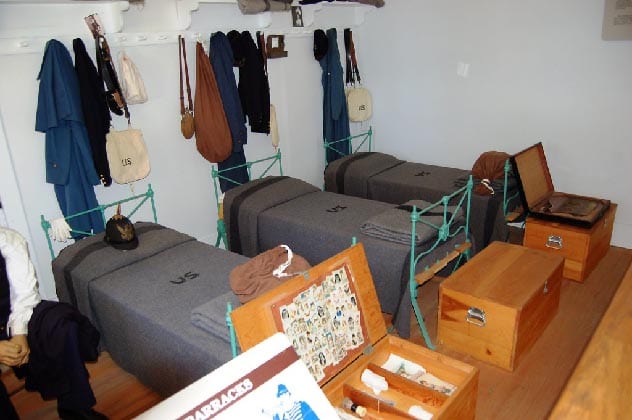
Most recruits are in their teens. They’ve never left home and some come from very insular communities; being exposed to the massive variety of personalities can come as a culture shock. There is also always a handful at the start who won’t bathe in the group shower (it’s like high school football, don’t think you get a private spa) due to insecurities and wind up stinking like crackheads covered in their own feces after only a few days of constant exercise. Usually their fellow soldiers are tasked with forcing the accused to shower, and sometimes it can be a traumatizing experience. When I went, one guy went two weeks until he was eventually covered in Pine-Sol and scrubbed clean as the D.S. looked on in approval. He never missed a single shower again.
There also may be people who have been home-schooled or just grew up sheltered in general and this is their first experience of a social environment. It can be traumatizing and either way it’s always a sociological circus. Some recruits do freak-out and have mental breakdowns. Cool kids realize they actually aren’t all that cool and thugs realize they aren’t tough at all. Basic training is as hard on the mind and soul as it is on the body. You realize humanity is bonkers insane, but there is a bonding that occurs . . . a “we’re all in this hell together” sort of thing.[6]
4 Running
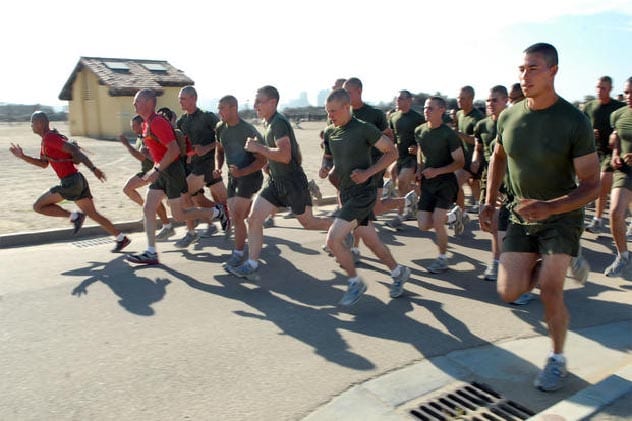
Running is essential to all aspects of military life. In basic, you’re up at 0435 Hours and on the road by 0500. Running is split into three groups. Group A are the all-stars, the ones able to do a two-mile run in under fifteen minutes. Group B are your average runners who need improvement. Group C are those who should have worked out more before signing their enlistment contract. A recruiter clearly floated them past the initial tests for the bonus. You’re placed into your group pretty much from the start.
Fun little story, when I attended Fort Leonard Wood (we called it “Lost in the Woods”), my D.S., because I ran Group A, would allow me a slice of key lime pie . . . as long as I ate it in front of the Group C runners. Looking back, hilarious but malicious.[7]
3 Wall Lockers and Contraband
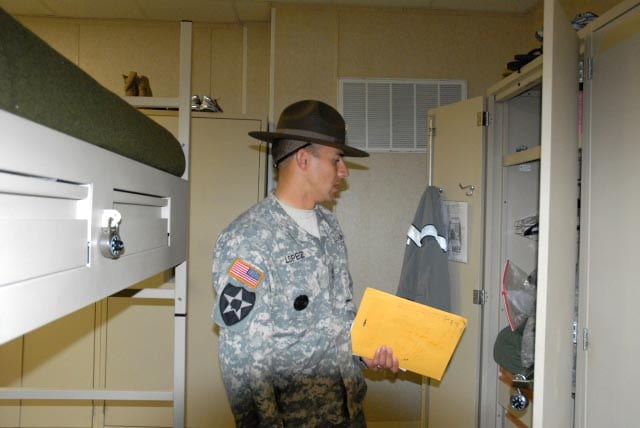
Everything you own in basic is kept in something called a “wall locker”. These wall lockers are constantly inspected, and just like your uniform, must constantly be kept up to code. A standard punishment for a whole platoon or company would be having these wall lockers thrashed beyond imagination and then have to clean the mess back up and get it to code again. This makes hiding contraband very difficult. Contraband in basic isn’t what you think. I had my mother hide candy bars in new packages of socks and underwear she sent to me. A snickers bar could go for as much as $20. It was a luxury in hell. Some morons even went as far as to drink Listerine (now banned) or hand-sanitizer to try and get a buzz. Basic can lead to some desperate times.[8]
2 The Outside World

As soon as you begin processing, all of your civilian documentation is taken away from you and you are left with a military issued I.D. and your debit card for the post exchange for soap and stationary. So, even if you were to sneak out of the barracks you still have no I.D. and you are confined, and probably being hunted, in a fortified first-world military compound. You’ll learn really quick you aren’t Jason Bourne.
You are also stripped of all communication devices. No cell phones, no tablets . . . nothing. I cannot stress this again. Nothing! You will not get access to email, and to this day everything is still analogue. You are allowed to hand-write letters on army–approved stationary and you get three phone calls the whole time. The first call once you get assigned to your company is to let your loved one’s know you are okay and where to send their letters. The second midway as a mental-reprieve, a reset for your soul to hear a loved one’s voice on the other end. And the final call to hopefully announce your pending graduation and success.
As for local and international news, every base puts out their own highly-censored weekly paper that everyone winds up fighting for to read the comics in the back. You are intentionally cut off from the world because the world is a distraction and you should only be focusing on your training. Plain and simple.[9]
1 Graduation
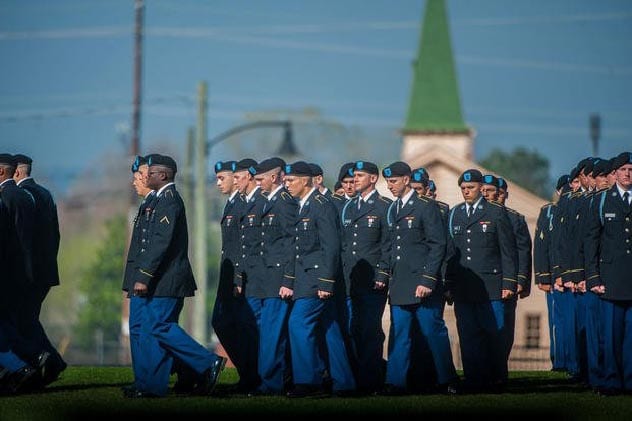
You did it! It is one of the finest feelings in the world to graduate basic training. It is akin to the birth of a child or nailing a dream job. You are no longer a civilian. Throughout all those weeks you’ve learned to be a functioning human and soldier. You’re no longer some clueless dope leaving a mess everywhere you go. You can take care of yourself, clean-up after yourself, and most importantly . . . defend yourself.
Graduation is also the final bond for those who have been through hell with you. Military jargon for a fellow soldier is called a “Battle”. I am still in contact with my Battles and ask on a regular basis how they are doing as they do me. Every once in a while a message appears in my inbox asking “What’s good, Battle?”, reminding me that I was a part of something and I did something most people could not. I’m proud every day of my service and I wanted those who did not, or could not serve, to get a little taste of the beautiful and worthwhile hell I went through for almost three months. Over and out.[10]
If you are interested in a career in the U.S. army, check out Go Army.
10 Real-Life Soldiers Straight From An Action Movie








